June 17, 2025 | 16:56 GMT +7
June 17, 2025 | 16:56 GMT +7
Hotline: 0913.378.918
June 17, 2025 | 16:56 GMT +7
Hotline: 0913.378.918
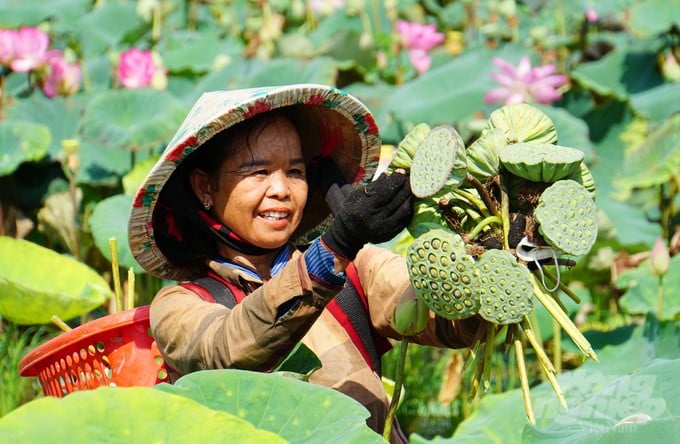
Lotus growing farmers earn profits that are 3–4 times higher than rice growing. Photo: Le Hoang Vu.
Dong Thap is a locality with favorable conditions for the development of lotus plants. In recent times, many lotus growing models have brought high economic efficiency to people, with profits that are 3–4 times higher than rice growing.
However, to enhance the value of the lotus industry and exploit the maximum potential of this typical plant species, Dong Thap has implemented a program to restructure the lotus industry, aiming for sustainable and effective development. Steps to restructure agriculture will open up many new opportunities for the lotus industry, contributing to economic growth and creating more jobs.
Lotus is one of the five key industries in Dong Thap province's agricultural restructuring project (rice, pangasius, mango, ornamental flowers, and lotus) and is being developed in the direction of reducing costs, improving quality, and increasing processed products towards quality, safety, and sustainability.
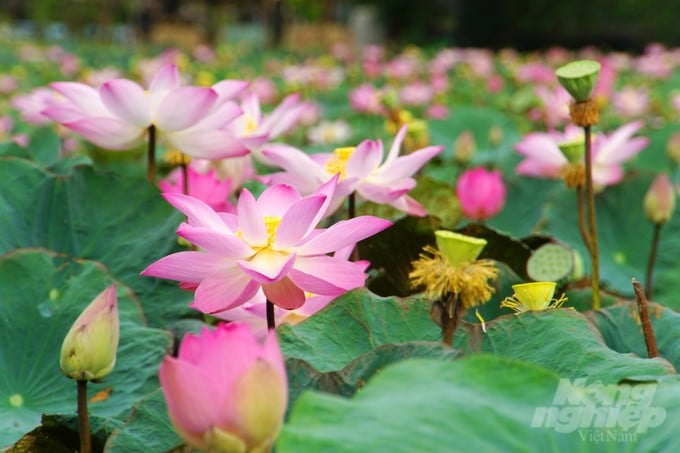
Lotus is one of the five key industries in Dong Thap province's agricultural restructuring project. Photo: Le Hoang Vu.
Mr. Nguyen Van Vu Minh, Director of Dong Thap Department of Agriculture and Rural Development, said that restructuring the lotus industry is one of the province's key strategies to improve the agricultural value chain. The lotus industry is now facing many challenges, such as small-scale production, a lack of processing systems, and a lack of product brands. Therefore, restructuring the lotus industry not only aims to increase output but also aims at quality and product diversification.
Accordingly, Dong Thap province has introduced technical and infrastructure support policies for lotus-growing households, cooperatives, and businesses. The province also encourages the development of products processed from lotus, such as lotus tea, lotus cakes, cosmetics made from lotus essential oil, functional foods, and lotus handicrafts. This helps farmers increase their income and reduce risks when agricultural product prices fluctuate.
Mr. Pham Thien Nghia, Chairman of the Dong Thap Provincial People's Committee, said: Lotus plants in Dong Thap are not only grown for seed-pod and root but are now also diversified with products from lotus essential oil and lotus silk and services such as viewing lotus fields and enjoying lotus cuisine. Thereby creating a high economic value chain. Currently, the lotus plant has been selected by the Dong Thap Provincial People's Committee to build and develop the brand of key agricultural products in Dong Thap province in the 2021–2025 period.
"Dong Thap province expects all lotus farmers, production facilities, and businesses in the locality to join hands to implement solutions to enhance the lotus plant, not only creating a local brand but also promoting the value chain of the province's lotus industry,” said Mr. Nghia.
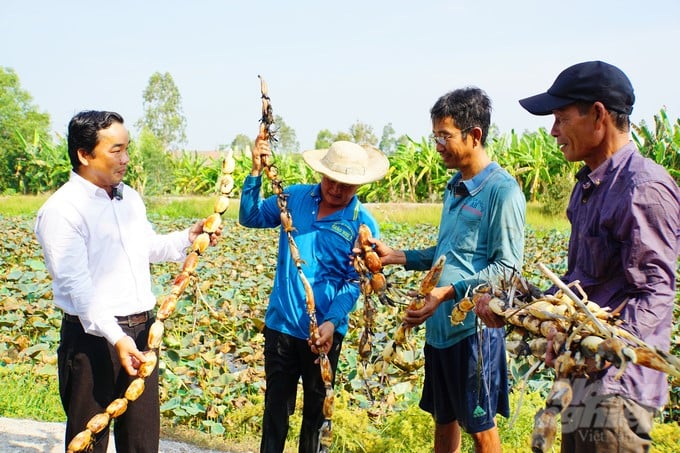
Dong Thap province expects all lotus farmers, production facilities, and businesses in the locality to join hands to implement solutions to improve the lotus plant. Photo: Le Hoang Vu.
Mr. Bui Van Son, Head of the Department of Agriculture and Rural Development of Thap Muoi district, said: In order for the lotus industry to develop, localities in the district need close cooperation between lotus growers, businesses, and governments. The district has conducted technical training courses for farmers, guiding them to apply new technologies to improve productivity and quality of lotus.
One of the highlights of the restructuring program is developing the lotus-growing cooperative model. The cooperative acts as an intermediary unit, helping to link farmers and businesses processing and exporting to demanding markets such as Japan, South Korea, and European countries. This is proof of the great potential of the lotus industry and the effectiveness of the restructuring program.
Mr. Ngo Chi Cong, Director of Khoi Minh Thanh Cong Production, Trade, and Service Co., Ltd. in Cao Lanh city, said: Products made from lotus that are quality, unique, and boldly Vietnamese were brought to conquer the world market, contributing to bringing economic value, improving people's income, and promoting the image of Dong Thap Lotus.
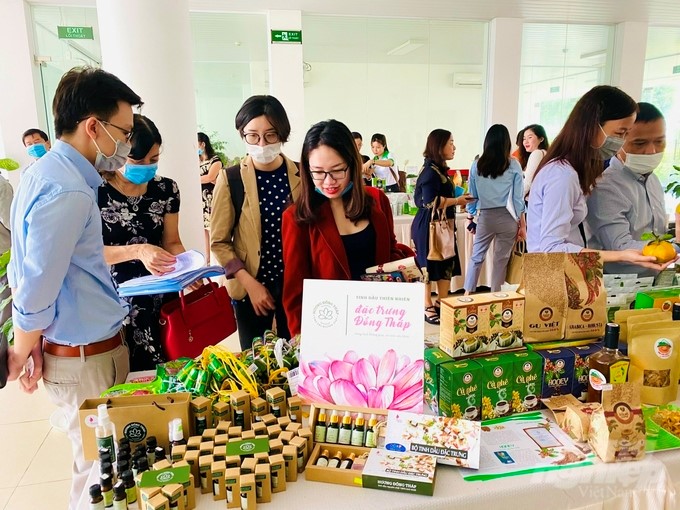
Restructuring the lotus industry not only helps increase people's income but also creates high-value products, contributing to promoting the image of Dong Thap province in the international market. Photo: Le Hoang Vu.
The lotus industry in Dong Thap is on a growing track with many new opportunities. Restructuring the lotus industry not only helps increase people's income but also creates high-value products, contributing to promoting the local image in the international market. According to the orientation to 2030, Dong Thap hopes that lotus will become one of the key agricultural products, with sustainable export capability and high economic value.
Translated by Thu Huyen
![Turning wind and rain into action: [5] Hue applies modern technology in disaster forecasting](https://t.ex-cdn.com/nongnghiepmoitruong.vn/608w/files/news/2025/06/17/z6704423696987_15fd32ffc26d590d204d520c9dac6786-nongnghiep-093938.jpg)
(VAN) In Hue city, modern technology has recently been applied in meteorological and hydrological forecasting and warning, helping to reduce the damage caused by natural disasters.

(VAN) A cutting-edge farming technique being implemented on an experimental ranch in Arizona's Sonoran Desert has already saved a billion gallons of water over five years, according to Civil Eats.

(VAN) Poultry and pig production and the environment can be boosted through enhanced water technology, according to new research.
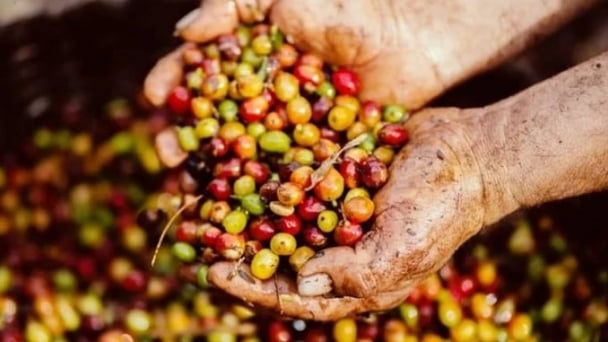
(VAN) Coffee prices on June 16, 2025 are unchanged. In Vietnam, local trading prices are holding steady, ranging around VND 112,000 – VND 112,500/kg.
![Turning wind and rain into action: [4] Bringing climate bulletins to remote and isolated areas](https://t.ex-cdn.com/nongnghiepmoitruong.vn/608w/files/linhnhp/2025/06/14/1152-z6704423696987_15fd32ffc26d590d204d520c9dac6786-nongnghiep-151141.jpg)
(VAN) The Vietnam Agriculture and Nature Newspaper interviewed Mr. Vu Thai Truong, Acting Head of Climate Change and Environment at UNDP Vietnam, to gain deeper insight into how climate bulletins are delivered to farmers.

(VAN) In Tien Giang, a high-tech shrimp farm has developed a distinctive energy-saving farming model that has yielded promising results.
![Turning wind and rain into action: [3] 300.000 farmers benefit from agro-climatic bulletins](https://t.ex-cdn.com/nongnghiepmoitruong.vn/608w/files/news/2025/06/12/e5a48259d6a262fc3bb3-nongnghiep-125122.jpg)
(VAN) The agro-climatic bulletin has become a valuable tool for farmers in the Mekong Delta. After more than five years of implementation, the initiative is gradually being expanded nationwide.